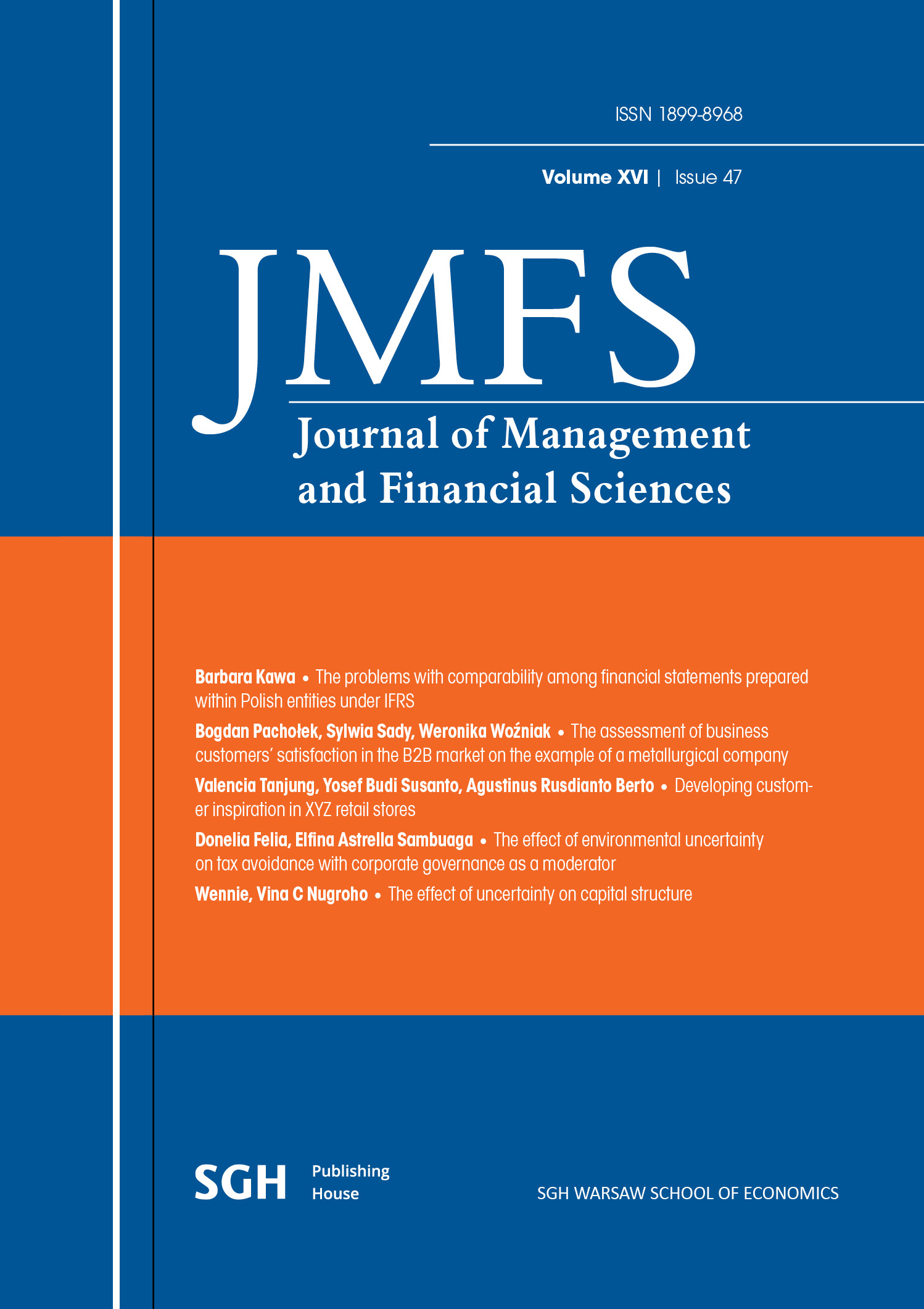The effect of environmental uncertainty on tax avoidance with corporate governance as a moderator
Main Article Content
Abstract
The study aims to examine the effect of environmental uncertainty on tax avoidance and the moderating effects of corporate governance. Data collection uses secondary data derived from the financial statements and annual reports of companies listed on the Indonesia Stock Exchange for the period of 2017–2019, using the S&P Capital IQ database. The population of this study consists of 80 companies with an observation period of 3 years. Thus, the total o research observations is 240, obtained by the purposive sampling method. The results showed that environmental uncertainty negatively affects tax avoidance. The indicators of corporate governance, which is an independent board of commissioners, can strengthen the relationship between environmental uncertainty and tax avoidance, while audit quality is proven to weaken the relationship between environmental uncertainty and tax avoidance.
Downloads
Article Details
References
2. Bimo, I.D., Prasetyo, C.Y., Susilandari, C.A. (2019). The effect of internal control on tax avoidance: The case of indonesia. Journal of Economics and Development, 21(2), pp. 131–143, https://doi.org/10.1108/jed-10-2019–0042
3. Carolina, V., Purwantini, A.H. (2020). Pengaruh Pengendalian Internal, Struktur Kepemilikan, Sales Growth, Ketidakpastian Lingkungan, dan Koneksi Politik terhadap Tax Avoidance (Studi Empiris Pada Perusahaan Manufaktur Yang Terdaftar di BEI Periode 2015–2019). 3 rd Prosiding Business and Economics Conference In Utilizing of Modern Technology 2020, pp. 154–173, Retrieved from https://journal.unimma.ac.id/index.php/conference/article/view/4151
4. Darvishmotevali, M., Altinay, L., Köseoglu, M.A. (2020). The link between environmental uncertainty, organizational agility, and organizational creativity in the Hotel Industry. International Journal of Hospitality Management, 87, https://doi.org/10.1016/j.ijhm.2020.102499
5. Deegan, C. (2014). Financial Accounting Theory (4th ed.). Sydney: McGraw-Hill.
6. Dianawati, D., Agustina, L. (2020). The Effect of Profitability, Liquidity, and Leverage on Tax Aggressiveness with Corporate Governance as Moderating Variable. Accounting Analysis Journal, 9(3), pp. 166–172, https://doi.org/https://doi.org/10.15294/aaj.v9i3.41626
7. Eksandy, A. (2017). Pengaruh Komisaris independen, Komite Audit, Dan Kualitas Audit Terhadap penghindaran Pajak (tax avoidance) (Studi Empiris Pada Sektor Industri Barang Konsumsi Yang Terdaftar di Bursa Efek Indonesia periode 2010–2014). Competitive Jurnal Akuntansi Dan Keuangan, 1(1), pp. 1–20, https://doi.org/10.31000/competitive.v1i1.96
8. Gallemore, J., Labro, E. (2015). The importance of the internal information environment for tax avoidance. Journal of Accounting and Economics, 60(1), pp. 149–167, https://doi.org/10.1016/j.jacceco.2014.09.005
9. Halioui, K., Neifar, S., Abdelaziz, F.B. (2016). Corporate Governance, CEO Compensation, and Tax Aggressiveness: Evidence from American firms listed on the NASDAQ 100. Review of Accounting and Finance, 15(4), pp. 445–462, https://doi.org/10.1108/raf-01-2015–0018
10. Harrison, J.S., Bosse, D.A., Phillips, R.A. (2010). Managing for stakeholders, stakeholder utility functions, and competitive advantage. Strategic Management Journal, 31(1), pp. 58–74, https://doi.org/10.1002/smj.801
11. Harrison, J.S., Freeman, R.E., de Abreu, M.C.S. (2015). Stakeholder theory as an ethical approach to effective management: Applying the theory to multiple contexts. Review of Business Management, 17(55), pp. 858–869, https://doi.org/10.7819/rbgn.v17i55.2647
12. Huang, H., Sun, L., Zhang, J. (2017). Environmental uncertainty and tax avoidance. Advances in Taxation, 24(1), pp. 83–124, https://doi.org/10.1108/s1058–749720170000024002
13. Islam, M.R. (2018). Sample size and its role in Central Limit Theorem (CLT). International Journal of Physics & Mathematics, 1(1), pp. 37–47, https://doi.org/10.31295/ijpm.v1n1.42
14. Jensen, M.C., Meckling, W.H. (1976). Theory of the firm: Managerial behavior, agency costs and ownership structure. Journal of Financial Economics, 3(4), pp. 305–360, https://doi.org/10.1016/0304-405x(76)90026-x
15. Kovermann, J., Velte, P. (2019). The impact of corporate governance on corporate tax avoidance – a literature review. Journal of International Accounting, Auditing and Taxation, 36(1), https://doi.org/10.1016/j.intaccaudtax.2019.100270
16. Laksono, D.G.D., Firmansyah, A. (2020). The role of managerial ability in Indonesia: Investment opportunity sets, environmental uncertainty, tax avoidance. Humanities & Social Sciences Reviews, 8(4), pp. 1305–1318, https://doi.org/10.18510/hssr.2020.84123
17. Lin, Y., Zhao, S., Li, N. (2014). A Study of Network-Building HR Practices for TMT, Strategic Flexibility and Firm Performance: The Moderating Role Of Environmental Uncertainty. Nankai Business Review International, 5(1), pp. 95–114, https://doi.org/10.1108/nbri-01-2014-0001
18. Mais, R.G., Patminingih, D. (2017). Effect Of Good Corporate Governance on Tax Avoidance of The Company in Listed of The Indonesia Stock Exchange (BEI). Jurnal STEI Ekonomi, 26(2), pp. 230–243, https://doi.org/https://doi.org/10.36406/jemi.v26i02.226
19. Mulyani, S., Wijayanti, A., Masitoh, E. (2018). Pengaruh Corporate Governance Terhadap TaxAavoidance (Perusahaan Pertambangan Yang terdaftar di BEI). Jurnal Riset Akuntansi Dan Bisnis Airlangga, 3(1), pp. 322–340, https://doi.org/10.31093/jraba.v3i1.91
20. Prismanitra, K., Sukirman, S. (2021). The Determinants of Tax Avoidance with Good Corporate Governance as A Moderating Variable. Accounting Analysis Journal, 10(2), pp. 101–107. https://doi.org/https://doi.org/10.15294/aaj.v10i2.47342
21. Ratu, M.K., Siregar, S.V. (2019). Does managerial ability and corporate governance mitigate tax avoidance activities when environmental uncertainty is considered? Proceedings of the 2018 International Conference on Islamic Economics and Business (ICONIES 2018), pp. 328–333, https://doi.org/10.2991/iconies-18.2019.66
22. Sunarsih, U., Oktaviani, K. (2016). Good corporate governance in manufacturing companies tax avoidance. Etikonomi, 15(2), pp. 85–96, https://doi.org/10.15408/etk.v15i2.3541
23. Surbakti, G.P.N., Sudaryati, E. (2021). Does Environment Uncertainty Affect Earnings Management? Jurnal Reviu Akuntansi Dan Keuangan, 11(2), pp. 294–305, https://doi.org/https://doi.org/10.22219/jrak.v11i2.17558
24. Syarendra, J.D., Kristanto, A.B. (2020). Environmental uncertainty, managerial ability and tax aggressiveness. Jurnal AKSI (Akuntansi Dan Sistem Informasi), 5(1), pp. 30–36, https://doi.org/10.32486/aksi.v5i1.474
25. Wahab, E.A.A., Ariff, A.M., Marzuki, M.M., Sanusi, Z.M. (2017). Political connections, corporate governance, and tax aggressiveness in Malaysia. Asian Review of Accounting, 25(3), pp. 424–451, https://doi.org/10.1108/ara-05-2016-0053
26. Yu, C.L., Wang, F., Brouthers, K.D. (2016). Competitor identification, perceived environmental uncertainty, and firm performance. Canadian Journal of Administrative Sciences, 33(1), pp. 21–35, https://doi.org/10.1002/cjas.1332
